Latest Podcasts
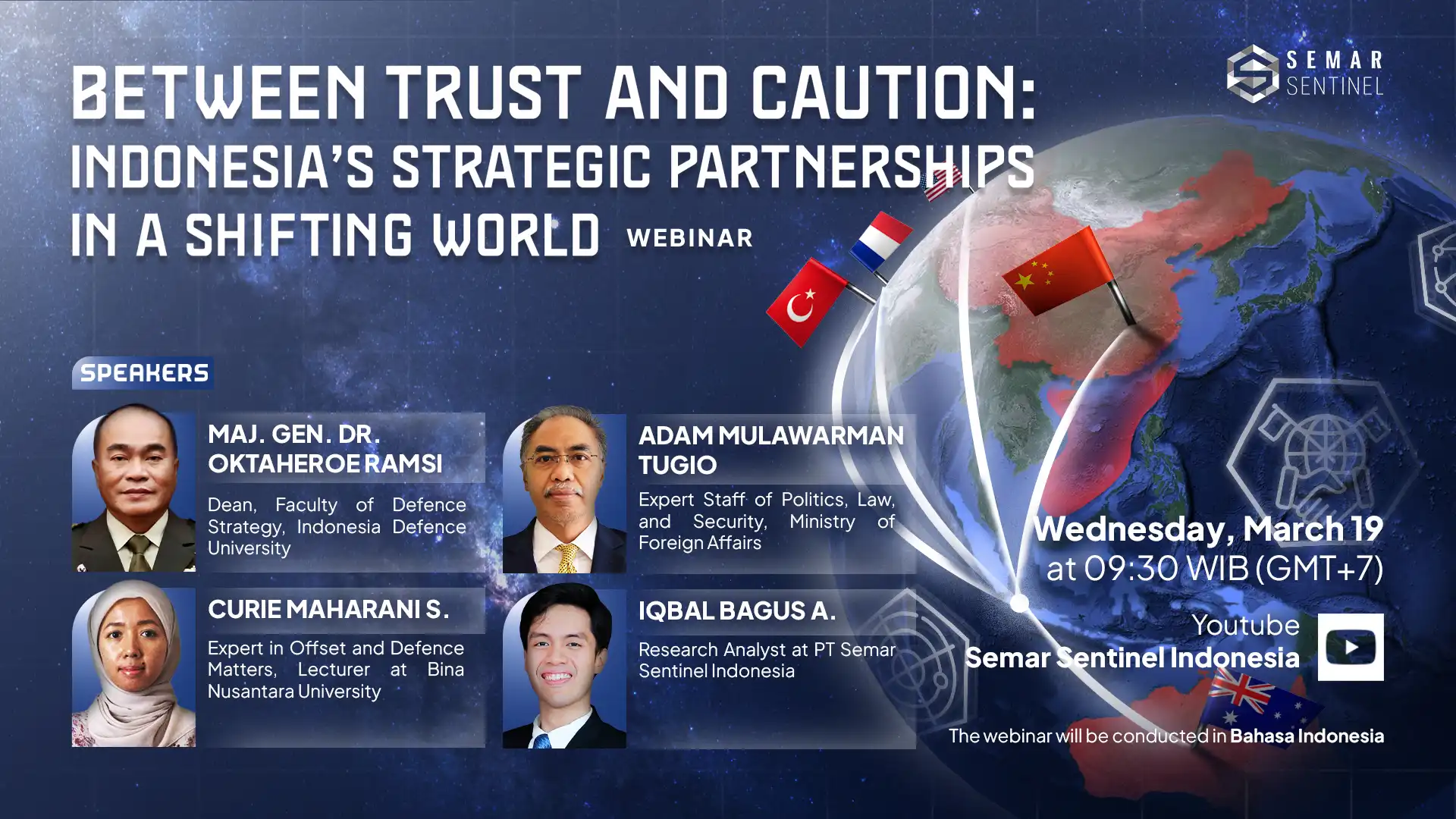
Between Trust and Caution: Indonesia’s Strategic Partnerships in a Shifting World

Between Trust and Caution: Indonesia’s Strategic Partnerships in a Shifting World
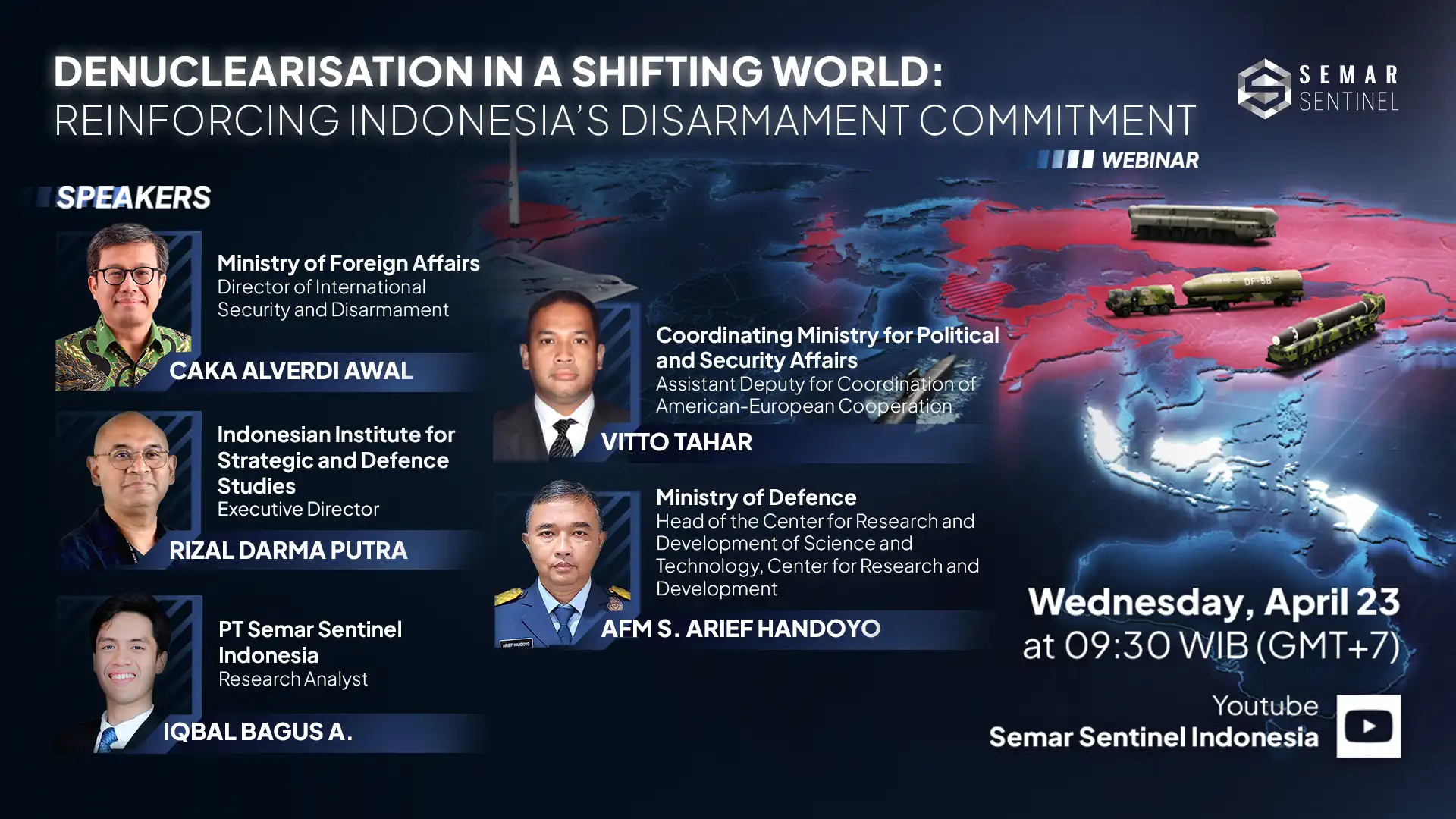
Denuclearisation in a Shifting World: Reinforcing Indonesia’s Disarmament Commitment

Denuclearisation in a Shifting World: Reinforcing Indonesia’s Disarmament Commitment

From Procurement to Progress: Ensuring the Viability of Defence Modernisation Projects

From Procurement to Progress: Ensuring the Viability of Defence Modernisation Projects
Browse All Topics of Our Podcasts
Explore a range of topics on our podcasts! Discover episodes that match your interests and dive into insightful discussions. Click to browse all topics.
Topics
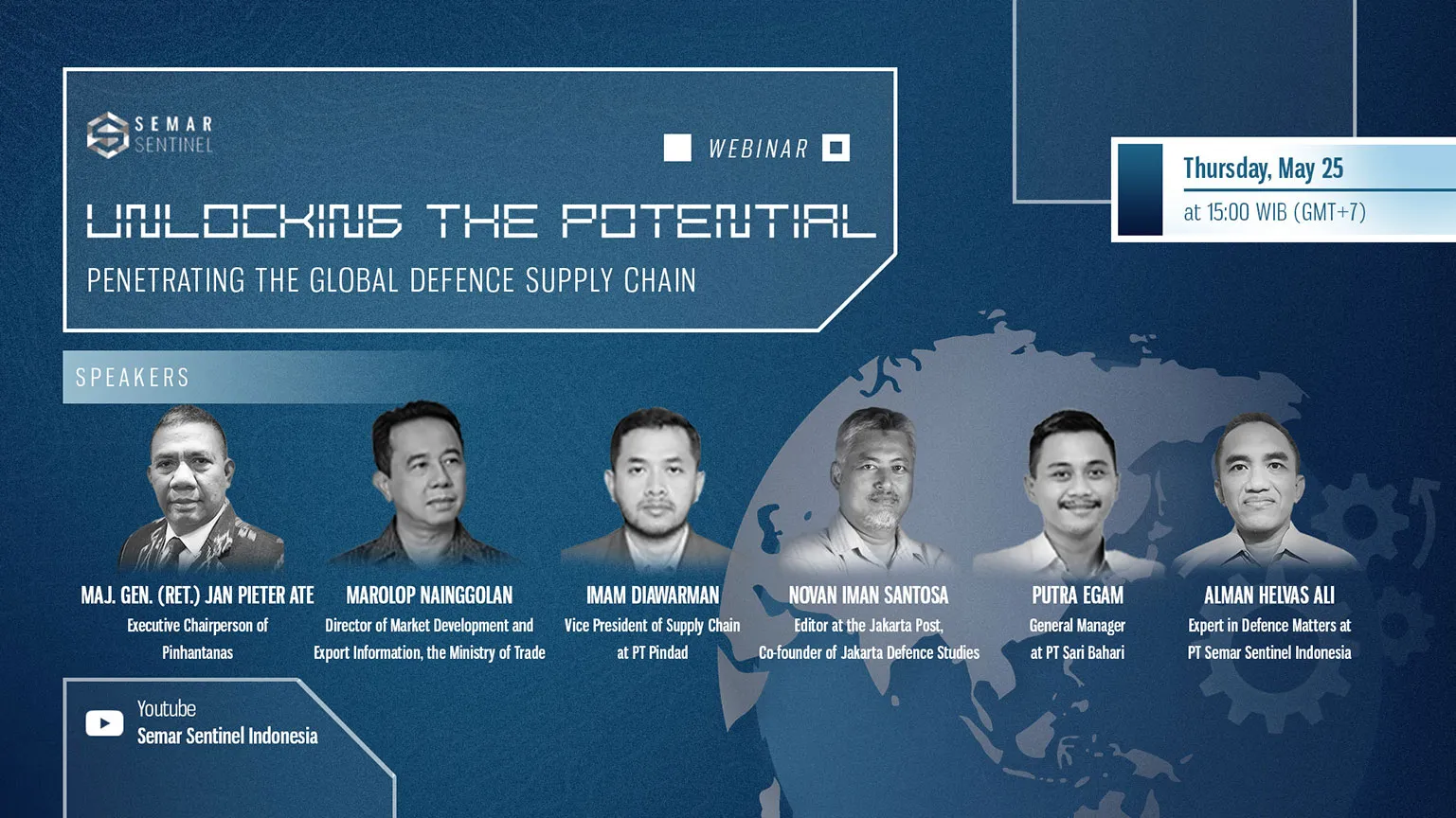
Unlocking the Potential: Penetrating the Global Defence Supply Chain
Opening Remarks
Anastasia Febiola S
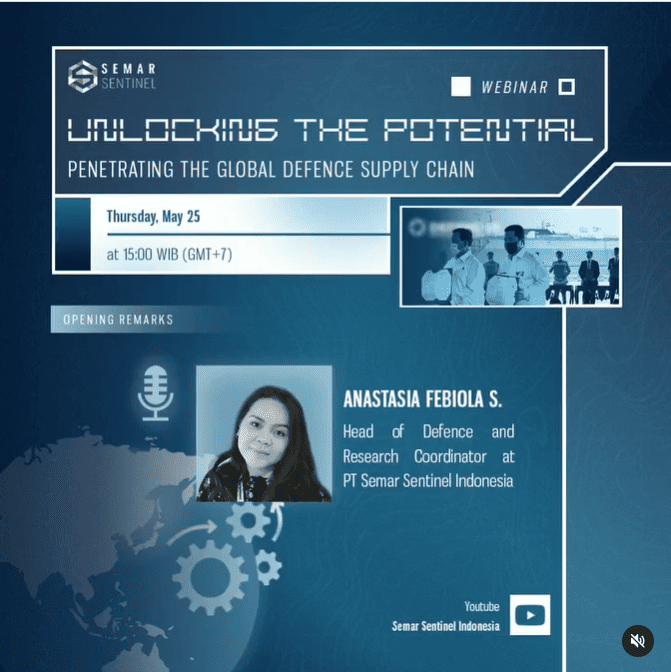
Anastasia Febiola S
Unlocking the Potential: Penetrating the Global Defence Supply Chain
Summary
Our Research Coordinator & Head of Defence, Anastasia Febiola S, stressed the importance for Indonesian defence companies to become part of the global supply chain to expand their business and technological capabilities.
Speaker
Maj. Gen. (Ret.) Jan Pieter Ate
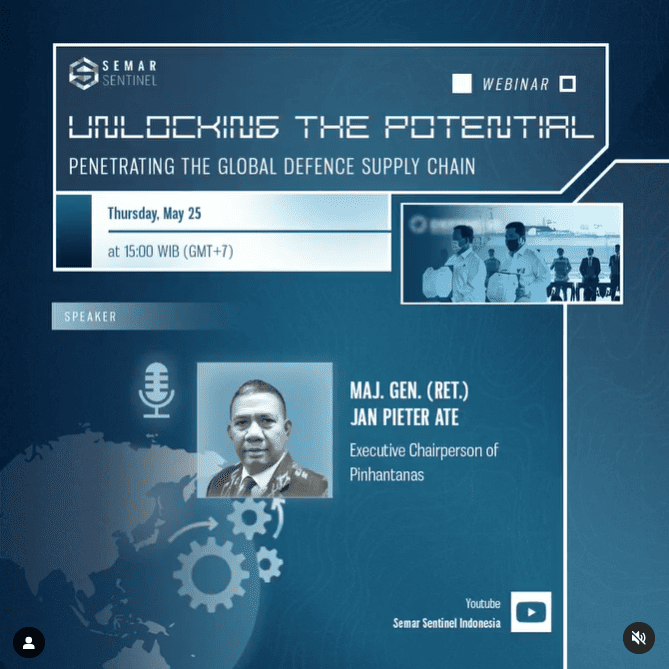
Maj. Gen. (Ret.) Jan Pieter Ate
Unlocking the Potential: Penetrating the Global Defence Supply Chain
Summary
In our latest webinar, Maj. Gen. (Ret.) Jan Pieter Ate, mentioned a number of challenges that hinder the Indonesian defence industry to become a key player in the global defence supply chain, including a lack of domestic support and clear long-term planning, as well as limited human resources.
Speaker
Astri Permatasari
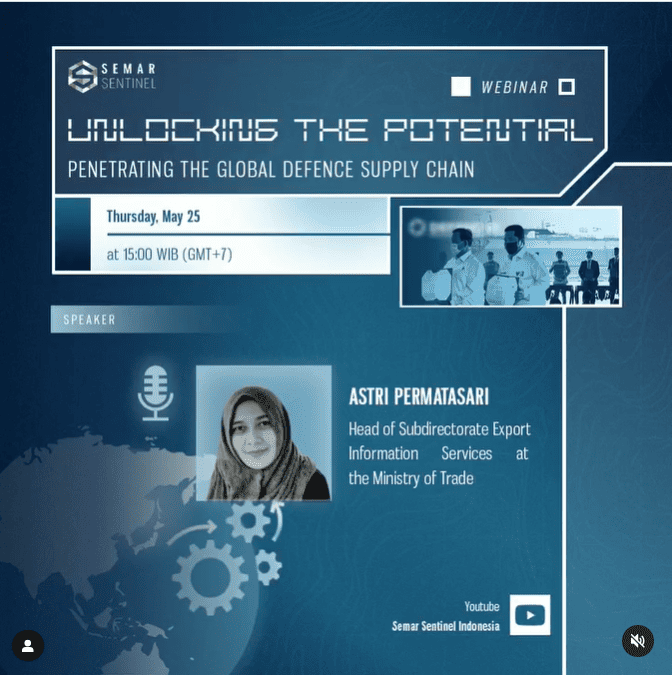
Astri Permatasari
Unlocking the Potential: Penetrating the Global Defence Supply Chain
Summary
In our latest discussion, Astri Permatasari discussed the current state of Indonesia’s defence product exports and identified the obstacles in the international market that need to be anticipated for Indonesia to boost its export. Ms. Permatasari also explained several facilities or services that the Ministry of Trade could give to local defence companies to expand their market abroad.
Speaker
Imam Diawarman
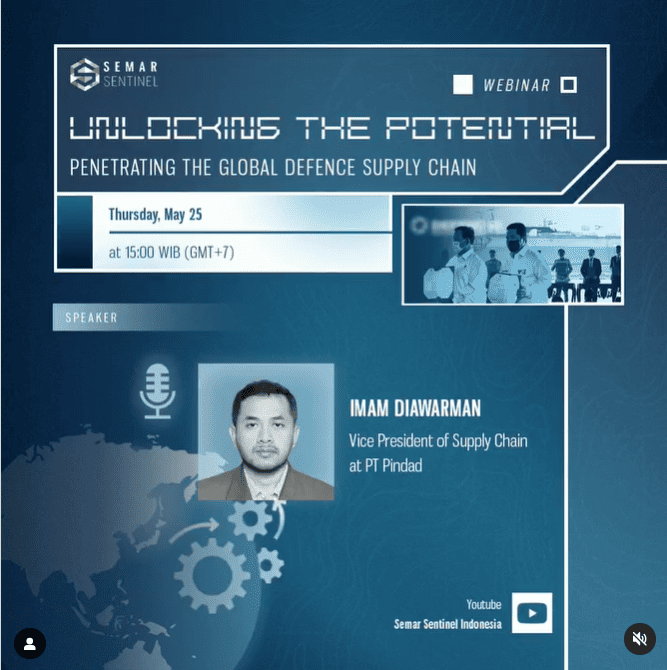
Imam Diawarman
Unlocking the Potential: Penetrating the Global Defence Supply Chain
Summary
In our latest discussion, Imam Diawarman revealed Pindad’s vision to become a major player in the global supply chain and explained the strategies to achieve this goal. M. Diawarman also mentioned some of Pindad’s achievements in increasing its production capacity and how it has formed various partnerships with foreign defence companies.
Speaker
Novan Iman Santosa
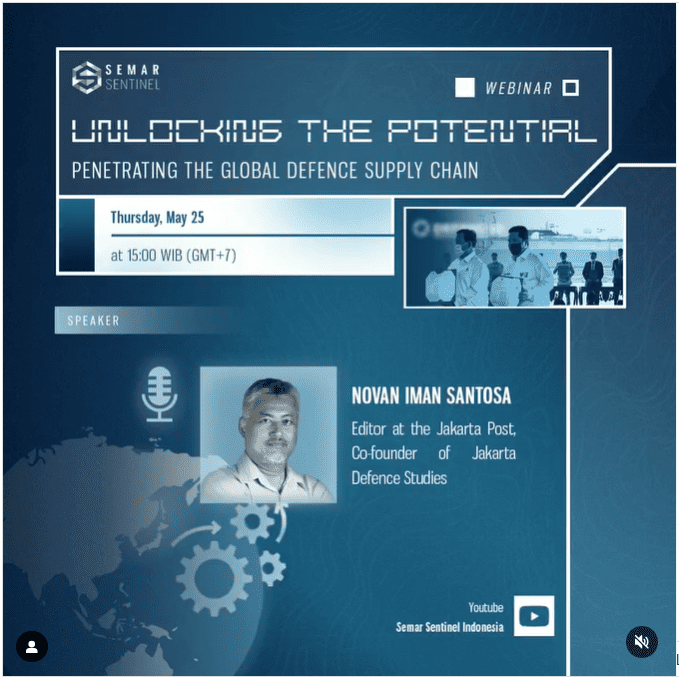
Novan Iman Santosa
Unlocking the Potential: Penetrating the Global Defence Supply Chain
Summary
In our latest discussion, Novan Iman Santosa explained several business alternatives besides design and manufacturing which should be developed by the Indonesian defence industry to develop its business at domestic and international markets.
Speaker
Putra Egam
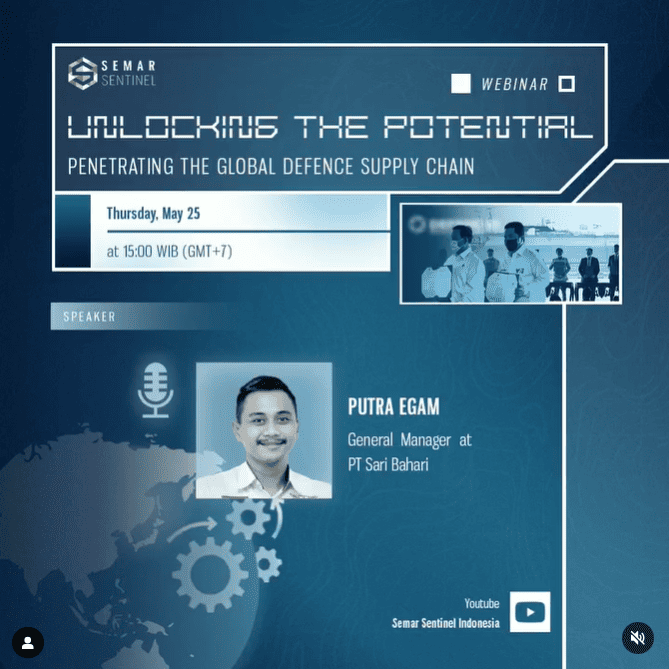
Putra Egam
Unlocking the Potential: Penetrating the Global Defence Supply Chain
Summary
In our latest discussion, Putra Egam, explained Sari Bahari’s targets and strategies to increase its presence in the international market, including by becoming part of the regional and global supply. M. Egam emphasised the need for Indonesian private defence companies to innovate consistently in order to meet present and future market demands.
Speaker
Alman Helvas Ali

Alman Helvas Ali
Unlocking the Potential: Penetrating the Global Defence Supply Chain
Summary
In our latest webinar, Alman Helvas Ali elaborated on the fundamental obstacles hindering the Indonesian defence industry from securing a more significant share of the global supply chain. M. Ali also gave his comments on the importance of the Indonesian defence industry in finding the right foreign partners who can provide assistance, especially in terms of capital, technological expertise, and market access.
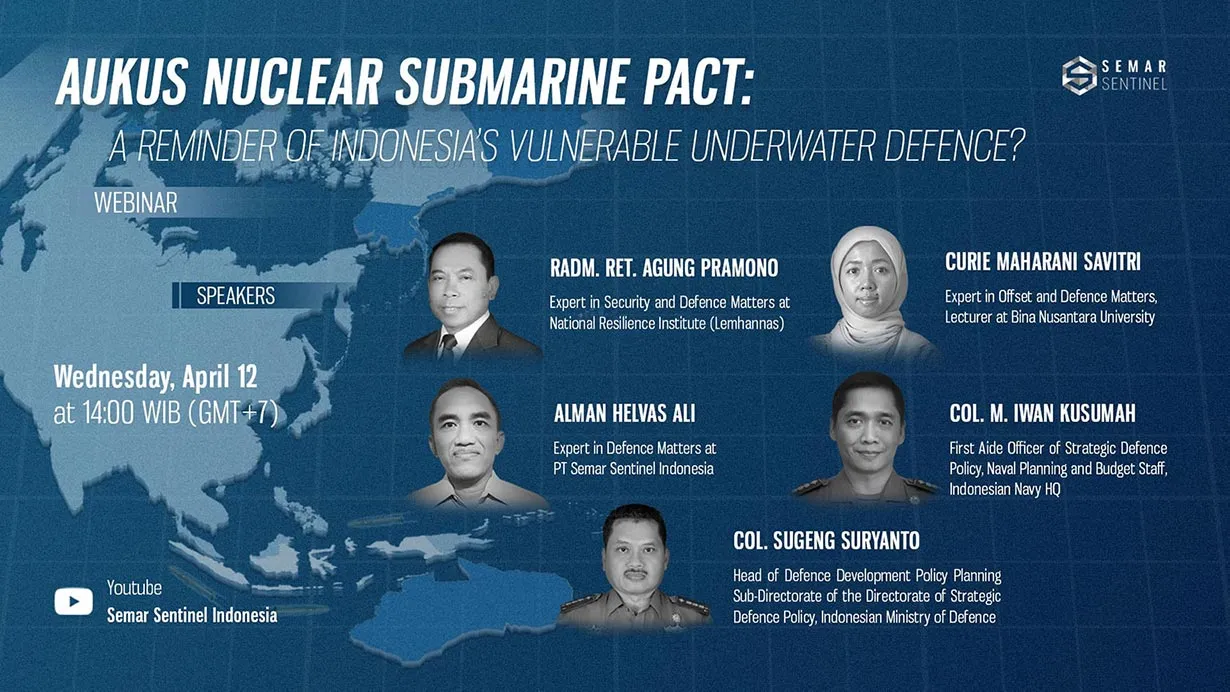
AUKUS Nuclear Submarine Pact: A Reminder of Indonesia’s Vulnerable Underwater Defence?
Opening Remarks
Anastasia Febiola S
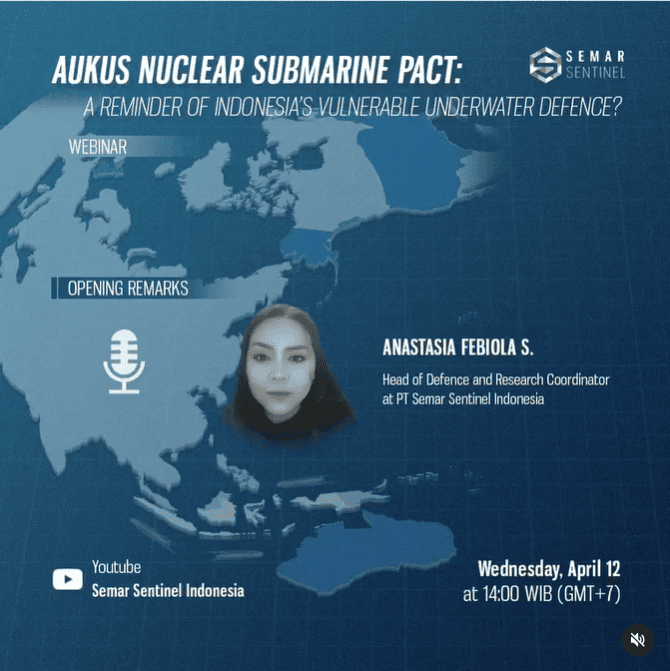
Anastasia Febiola S
AUKUS Nuclear Submarine Pact: A Reminder of Indonesia’s Vulnerable Underwater Defence?
Summary
Our Research Coordinator & Head of Defence, Anastasia Febiola S, mentioned how the latest strategic development in the Indo-Pacific serves as a reminder of the importance of Indonesia to have an optimum national defence posture to protect its territorial sovereignty and national interests.
Speaker
Curie Maharani Savitri

Curie Maharani Savitri
AUKUS Nuclear Submarine Pact: A Reminder of Indonesia’s Vulnerable Underwater Defence?
Summary
In our latest webinar, Curie Maharani Savitri, explained the impact of the AUKUS nuclear submarine pact and recommended several strategic options that Jakarta can adopt in response to the alliance as well as the concerning trend in the great power competition within the Indo-Pacific Region, which includes enhancing its arms modernisation programme and defence diplomacy.
Speaker
Col. Iwan Kusumah
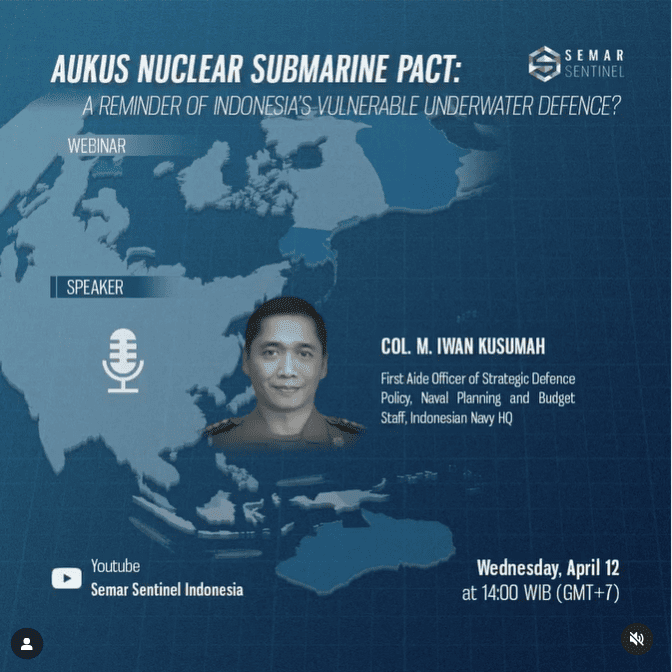
Col. Iwan Kusumah
AUKUS Nuclear Submarine Pact: A Reminder of Indonesia’s Vulnerable Underwater Defence?
Summary
In our latest discussion, Col. Iwan Kusumah stated that AUKUS is one of the latest wake-up calls for Indonesia to improve its underwater defence. M. Kusumah also shared his views on Indonesia’s maritime defence concept and strategy, as well as the requirements for the Indonesian Navy’s future submarine fleet amid the rising arms race and geopolitical tension in the region.
Speaker
Col. Sugeng Suryanto
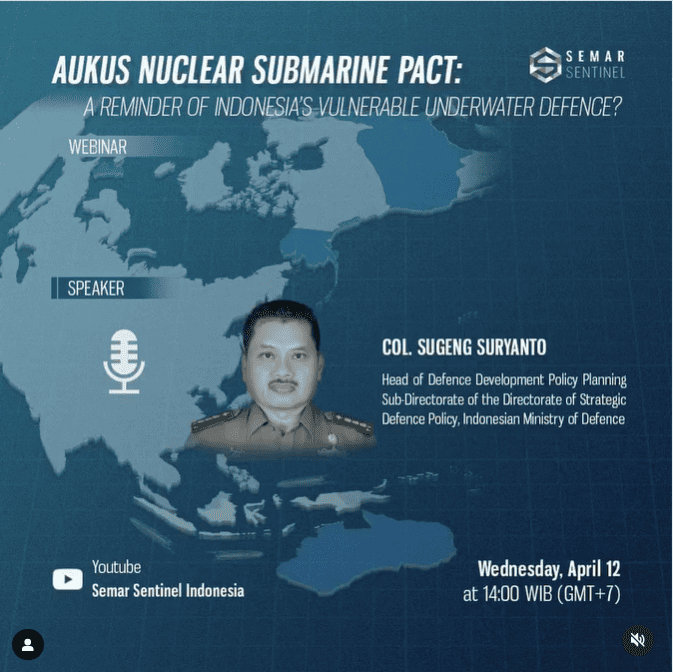
Col. Sugeng Suryanto
AUKUS Nuclear Submarine Pact: A Reminder of Indonesia’s Vulnerable Underwater Defence?
Summary
In our latest discussion, Col. Sugeng Suryanto stressed that Indonesia’s defence strategy also takes into account the strategic developments at the regional and global levels. When it comes to improving Indonesia’s maritime defence, some of the modernisation programmes are focused on improving the Indonesian Navy’s submarines and surface combatants fleet.
Speaker
RADM (Ret.) Agung Pramono

RADM (Ret.) Agung Pramono
AUKUS Nuclear Submarine Pact: A Reminder of Indonesia’s Vulnerable Underwater Defence?
Summary
In our latest discussion, RADM (Ret.) Agung Pramono stated that many factors influence defence-related strategies and policy, including geopolitics and national resources. M. Pramono further emphasised that the Indonesian National Armed Forces (TNI) will only become strong if it is supported by a strong and independent indigenous defence industry.
Speaker
Alman Helvas Ali
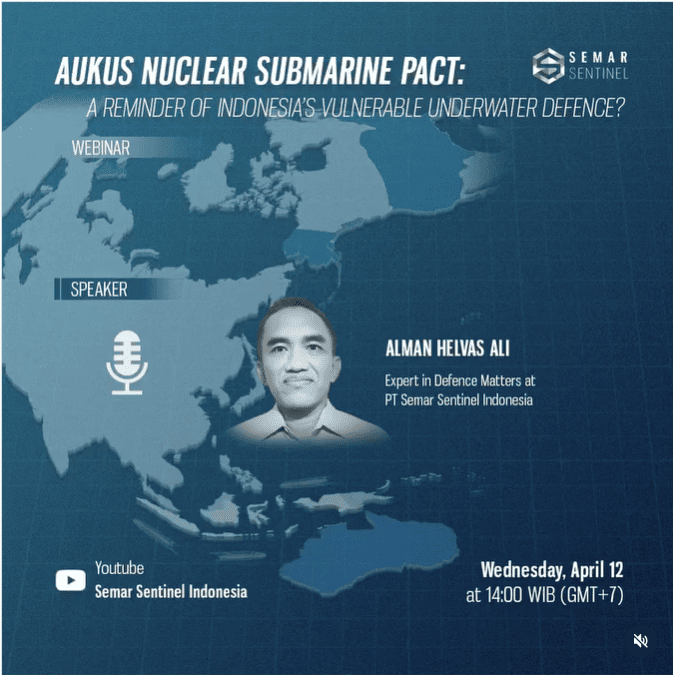
Alman Helvas Ali
AUKUS Nuclear Submarine Pact: A Reminder of Indonesia’s Vulnerable Underwater Defence?
Summary
In our latest webinar, Alman Helvas Ali gave his comments about how Indonesia should see AUKUS as an opportunity and challenge when it comes to creating a long-term defence investment and procurement plan, as well as enhancing Indonesian Navy’s underwater deterrence through the procurement of a more capable submarine platform, among other things.
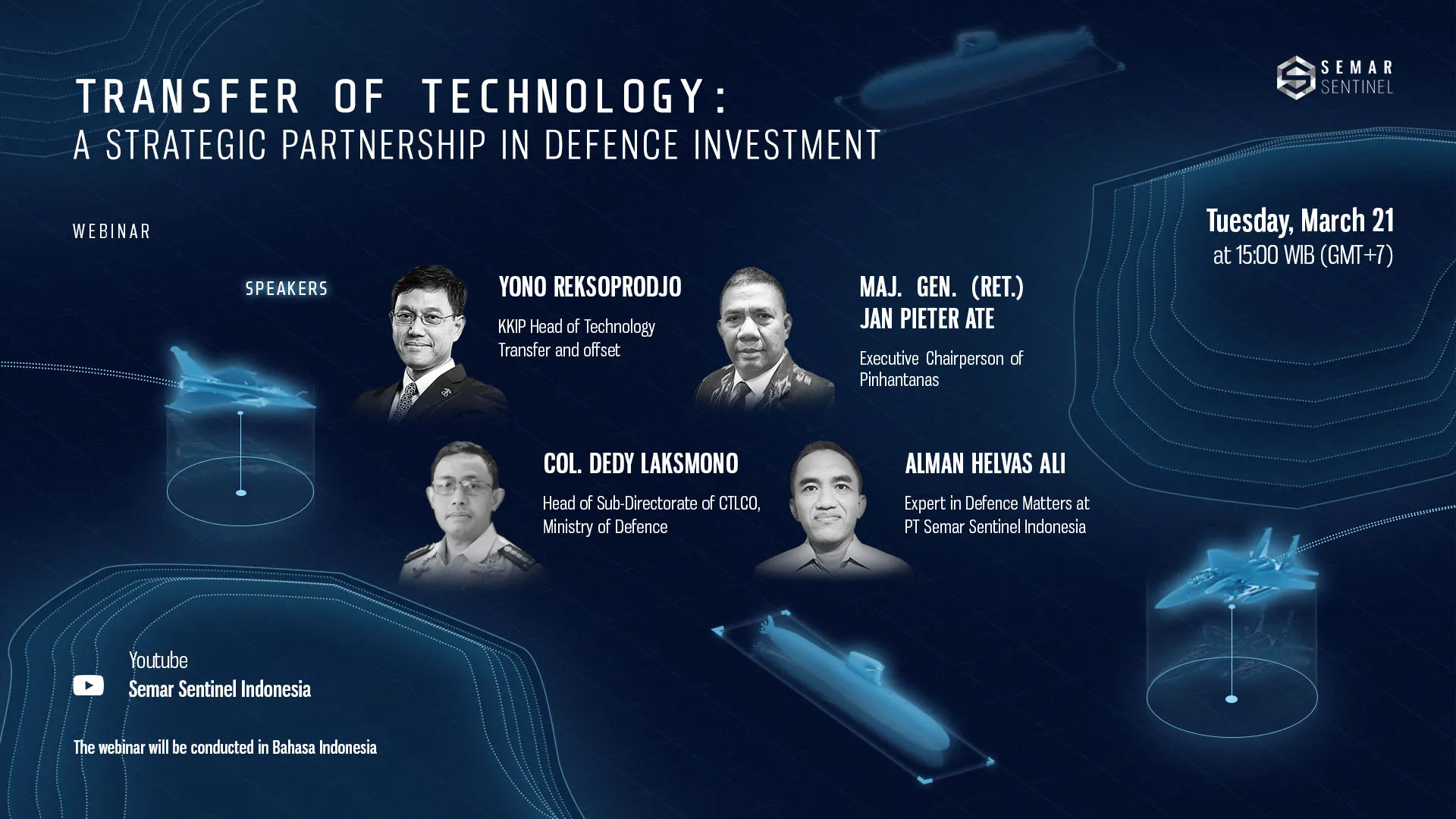
Transfer of Technology: A Strategic Partnership in Defence Investment
Opening Remarks
Anastasia Febiola S

Anastasia Febiola S
Transfer of Technology: A Strategic Partnership in Defence Investment
Summary
Our Research Coordinator & Head of Defence, Anastasia Febiola S, underlined the benefit for Indonesia to have a long-term commitment to defence technology transfer which should be seen as a strategic investment.
Speaker
Maj. Gen. (Ret.) Jan Pieter Ate
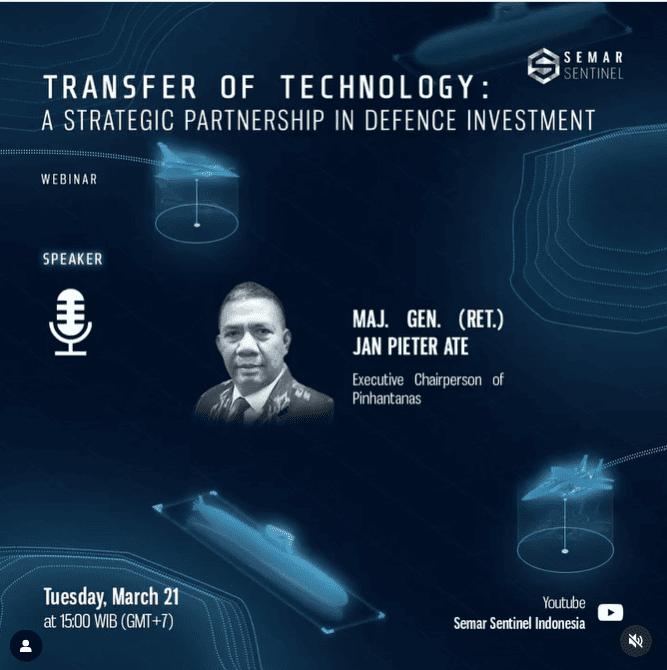
Maj. Gen. (Ret.) Jan Pieter Ate
Transfer of Technology: A Strategic Partnership in Defence Investment
Summary
In our latest webinar, Maj. Gen. (Ret.) Jan Pieter Ate conveyed how technology transfer programmes from arms procurement are directly related to the independence and strength of Indonesia’s national defence. Hence, Indonesia must prioritise arms procurement proposals with the most transfer of technology potential.
Speaker
Col. Dedy Laksmono

Col. Dedy Laksmono
Transfer of Technology: A Strategic Partnership in Defence Investment
Summary
In our latest discussion, Col. Dedy Laksmono presented the conditions of Indonesia’s defence industry as well as how in the past six years the Ministry of Defence has managed to secure dozens of offset programmes with a total value of billions of US dollars.
Speaker
Yono Reksoprodjo
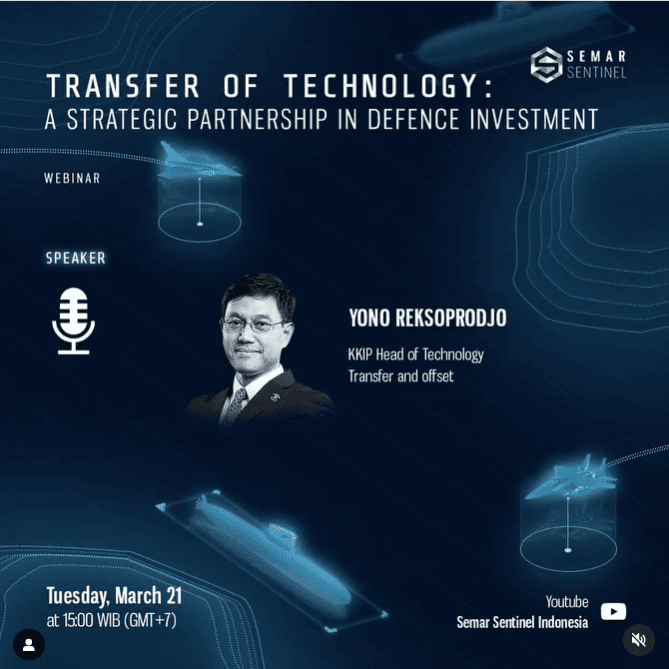
Yono Reksoprodjo
Transfer of Technology: A Strategic Partnership in Defence Investment
Summary
In our latest discussion, Yono Reksoprodjo explained Indonesia’s defence industry targets, several challenges to achieve them, and what forms of long-term transfer of technology cooperation and investment will bring more benefits not only for domestic defence firms but also foreign OEMs.
Speaker
Alman Helvas Ali
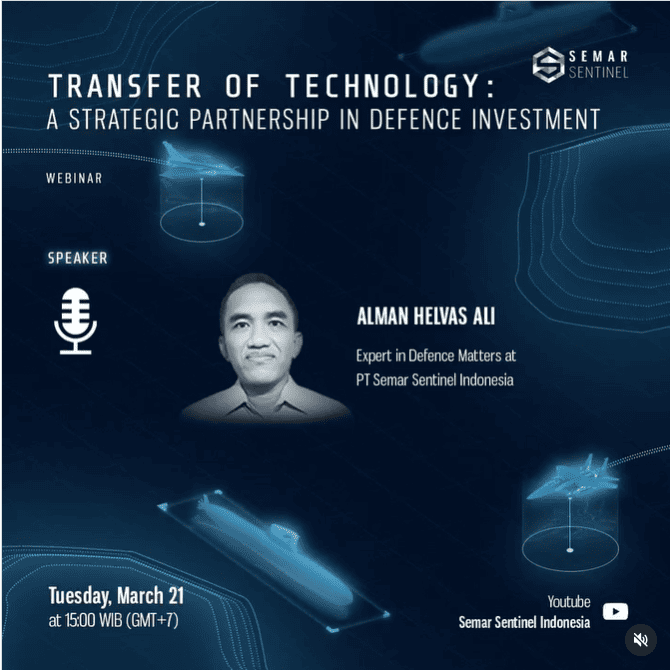
Alman Helvas Ali
Transfer of Technology: A Strategic Partnership in Defence Investment
Summary
In our latest webinar, Alman Helvas Ali gave insights on technical and non-technical matters that affect the transfer and mastery of defence technology in Indonesia. M. Ali also gave several recommendations in order for Indonesia to advance its defence industry ecosystem.
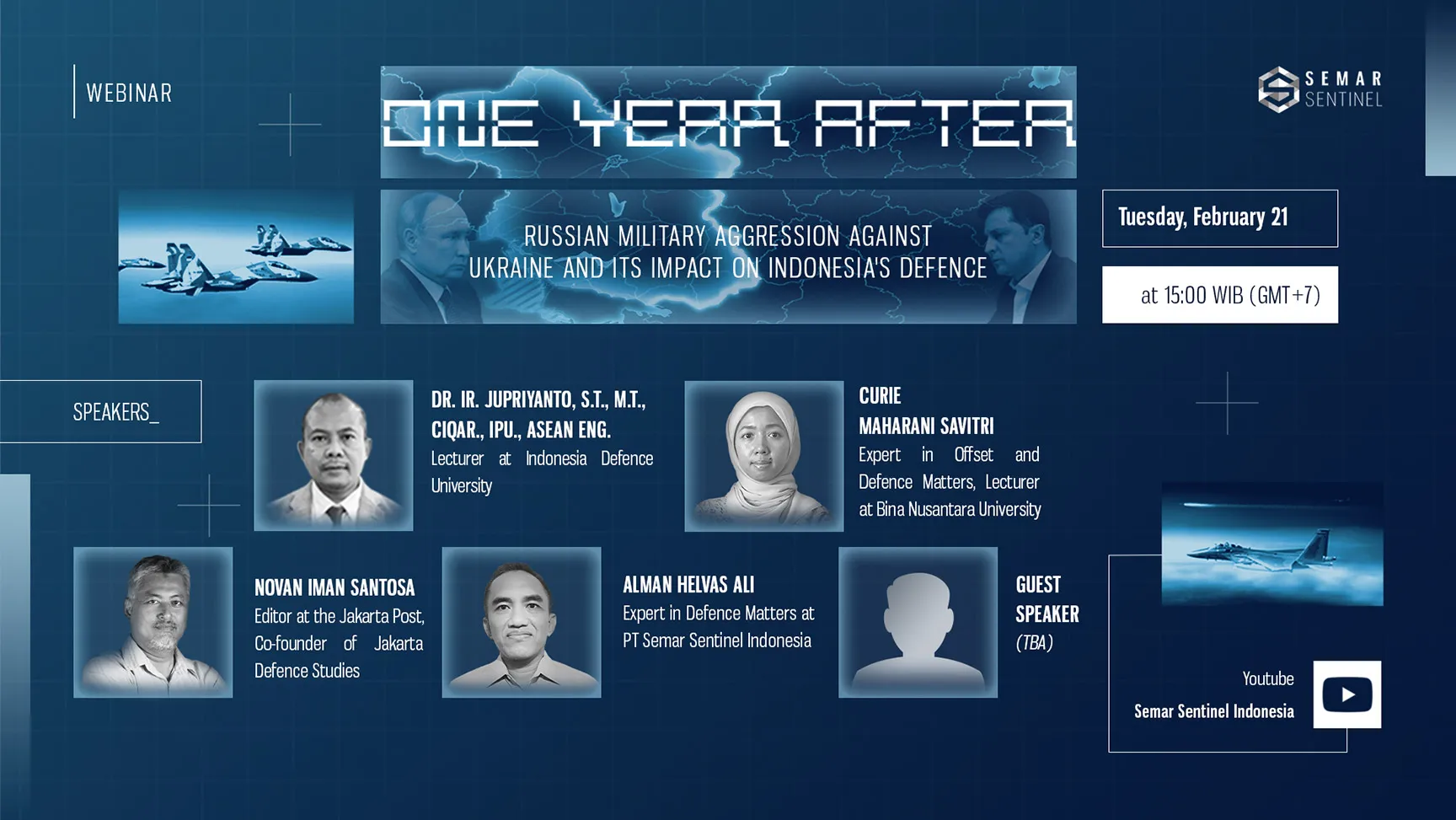
One Year After: Russian Military Aggression Against Ukraine and Its Impact on Indonesia’s Defence
Opening Remarks
Anastasia Febiola S
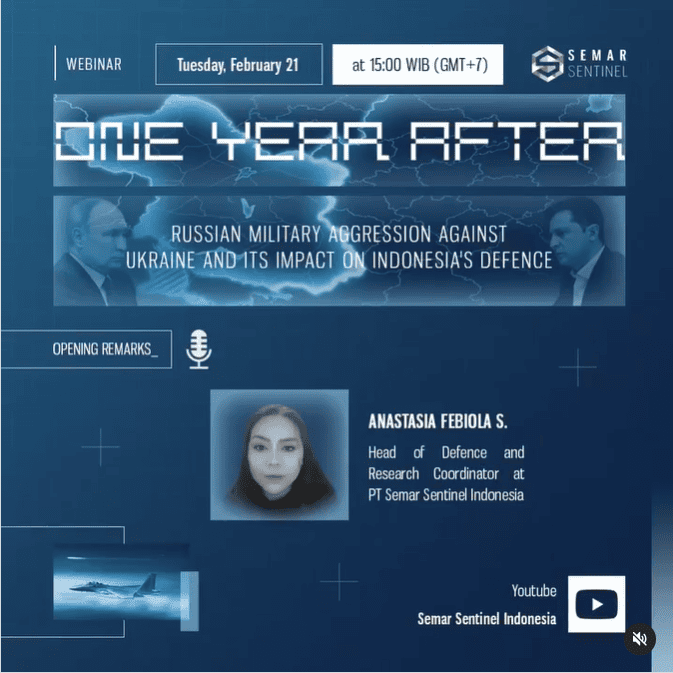
Anastasia Febiola S
One Year After: Russian Military Aggression Against Ukraine and Its Impact on Indonesia’s Defence
Summary
Our Research Coordinator & Head of Defence, Anastasia Febiola S., mentioned how significant the ongoing war in Ukraine is to Indonesia’s national defence posture and modernisation programme.
Speaker
Jupriyanto
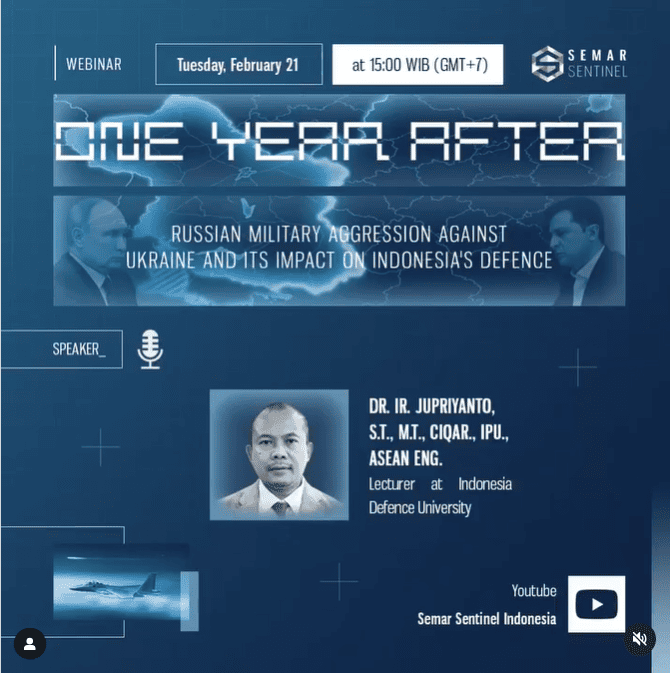
Jupriyanto
One Year After: Russian Military Aggression Against Ukraine and Its Impact on Indonesia’s Defence
Summary
In our latest webinar, Jupriyanto explained the lessons that Indonesia could learn from the war between Russia and Ukraine. M. Jupriyanto also emphasised that Indonesia must choose the right foreign partners to help it develop its defence capability.
Speaker
Novan Iman Santosa
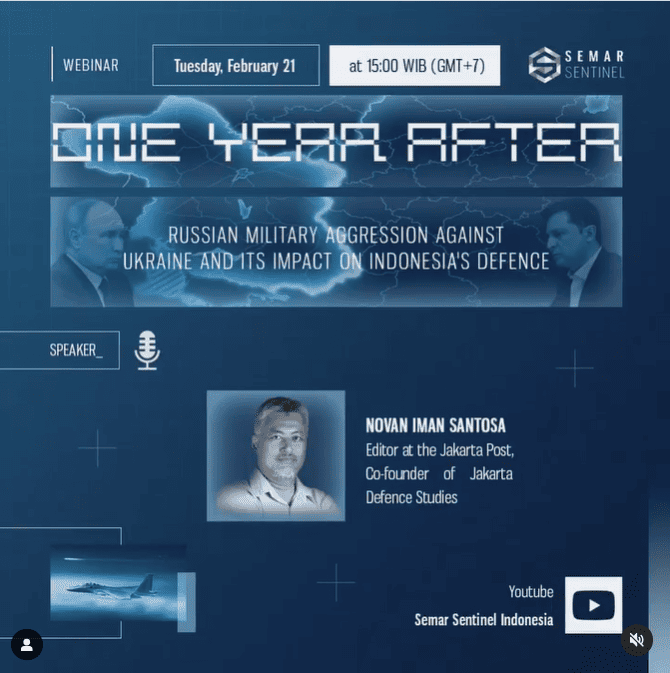
Novan Iman Santosa
One Year After: Russian Military Aggression Against Ukraine and Its Impact on Indonesia’s Defence
Summary
In our latest discussion, Novan Iman Santosa highlighted that the ongoing war between Russia and Ukraine provides many lessons that Indonesia can learn form. For instance, the importance of having a strong industrial capability as well as strategic partnerships with other countries to continue to fight.
Speaker
Curie Maharani Savitri
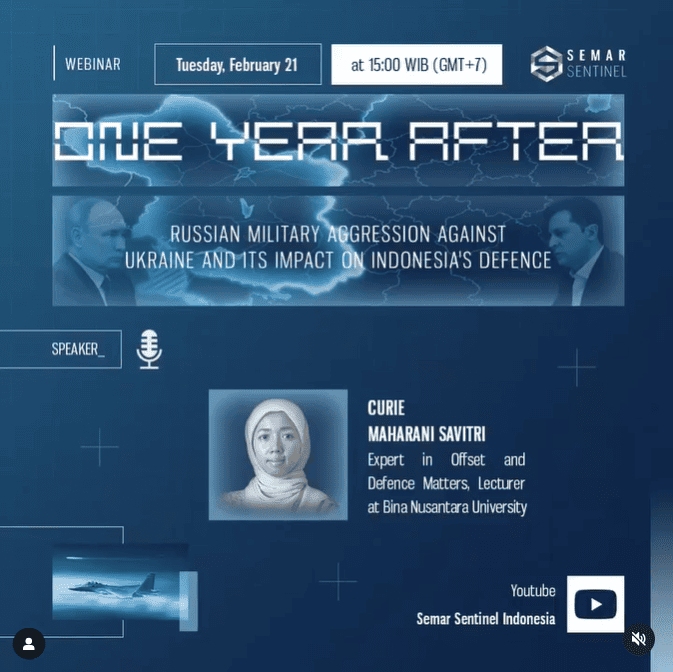
Curie Maharani Savitri
One Year After: Russian Military Aggression Against Ukraine and Its Impact on Indonesia’s Defence
Summary
In our latest webinar, Curie Maharani Savitri offered several alternative defence-related policies that Indonesia could adopt to overcome some of the challenges that the Russian military invasion of Ukraine presents to the Indonesian National Armed Forces (TNI) readiness and modernisation process.
Speaker
Alman Helvas Ali
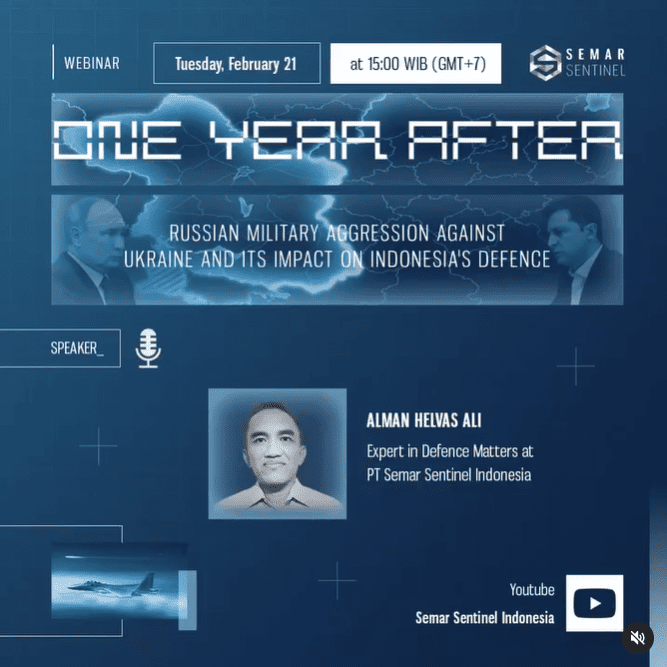
Alman Helvas Ali
One Year After: Russian Military Aggression Against Ukraine and Its Impact on Indonesia’s Defence
Summary
In our latest discussion, Alman Helvas Ali explained how the ongoing Russian invasion of Ukraine has ripple effects on global defence industries. M. Ali also shared his views on what Indonesia can learn from the war in Ukraine to have a more capable domestic defence industry and national defence posture.

2023: A Good Year for Domestic Defence Industry?
Opening Remarks
Anastasia Febiola S
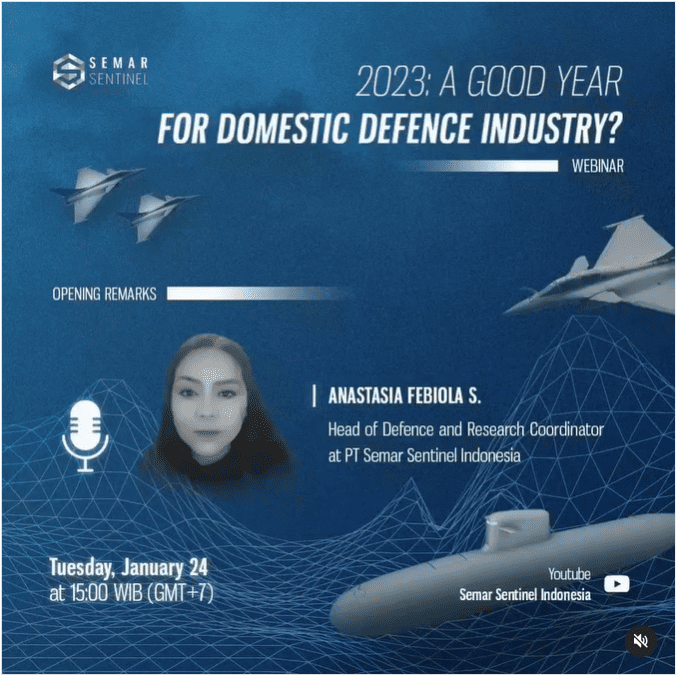
Anastasia Febiola S
2023: A Good Year for Domestic Defence Industry?
Summary
Our Research Coordinator & Head of Defence, Anastasia Febiola S, explained several internal and external key factors that will determine the fate of Indonesia’s defence industry in 2023.
Speaker
Maj. Gen. Rodon Pedrason
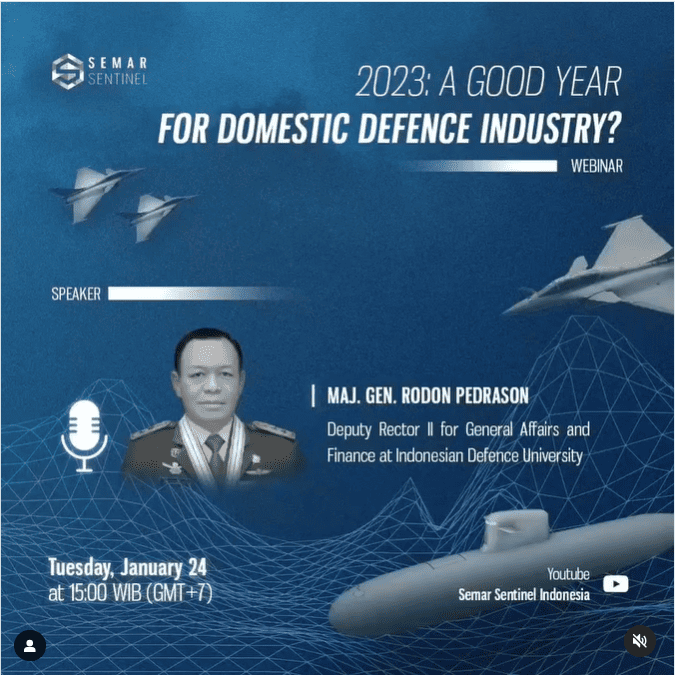
Maj. Gen. Rodon Pedrason
2023: A Good Year for Domestic Defence Industry?
Summary
In our latest discussion, Maj. Gen. Rodon Pedrason explained the complexity of modernising an armed forces while at the same time advancing the domestic defence industry, especially with the growing geopolitical tensions in the region. M. Pedrason also shared his thoughts on how Indonesia could choose the best domestic and foreign partners in boosting its national defence.
Speaker
Maj. Gen. (Ret.) Jan Pieter Ate
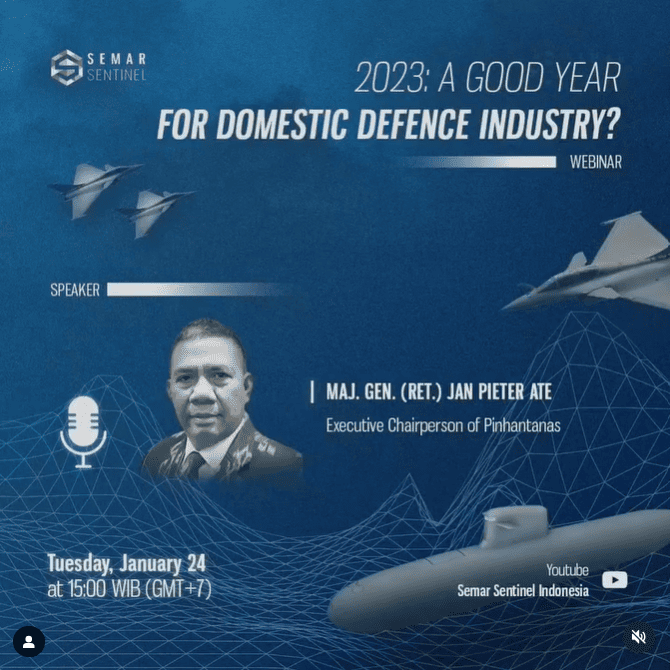
Maj. Gen. (Ret.) Jan Pieter Ate
2023: A Good Year for Domestic Defence Industry?
Summary
In our latest webinar, Maj. Gen. (Ret.) Jan Pieter Ate explained the challenges faced by Indonesian private defence firms in obtaining contracts from the government and selling their products in the international market. M. Ate also shared his views on the prospects in the Indonesian defence market in 2023.
Speaker
Rizal Darma Putra
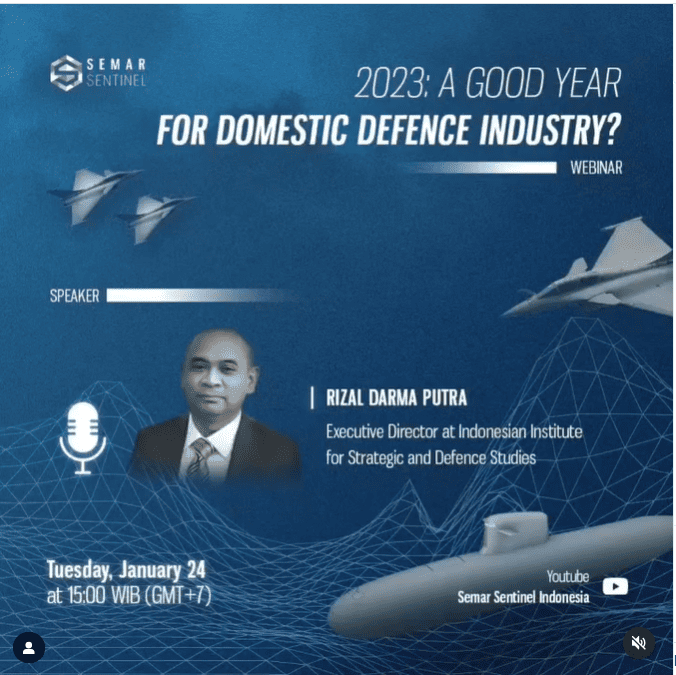
Rizal Darma Putra
2023: A Good Year for Domestic Defence Industry?
Summary
In our latest discussion, Rizal Darma Putra highlighted several principles that must be followed in Indonesia’s defence modernisation process. Furthermore, M. Putra discussed how geopolitic competition in both regional and global levels greatly affect the defence industry and market.
Speaker
Alman Helvas Ali
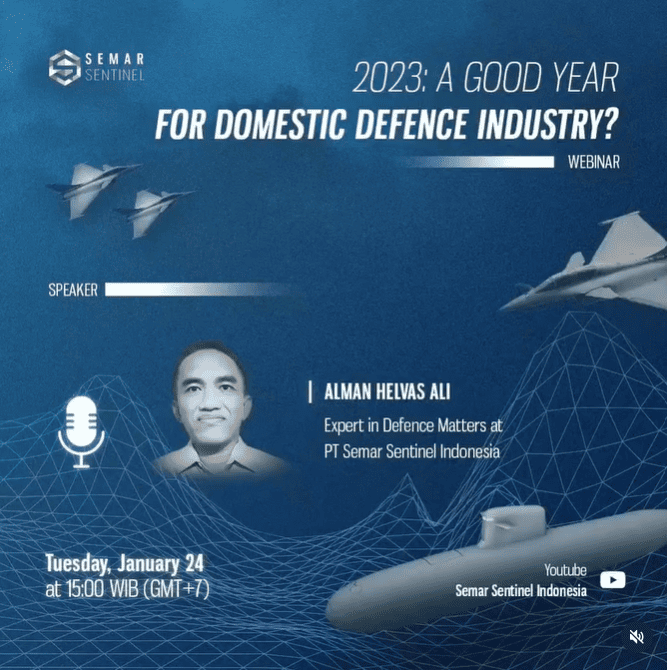
Alman Helvas Ali
2023: A Good Year for Domestic Defence Industry?
Summary
In our latest webinar, Alman Helvas Ali gave an overview regarding the current condition of the Indonesian defence industry and ways to improve it. M. Ali also believes that Indonesia should be more active in selling its products in the international arms market to help its domestic defence industry achieve economies of scale given the low demand from the domestic market, among other things.
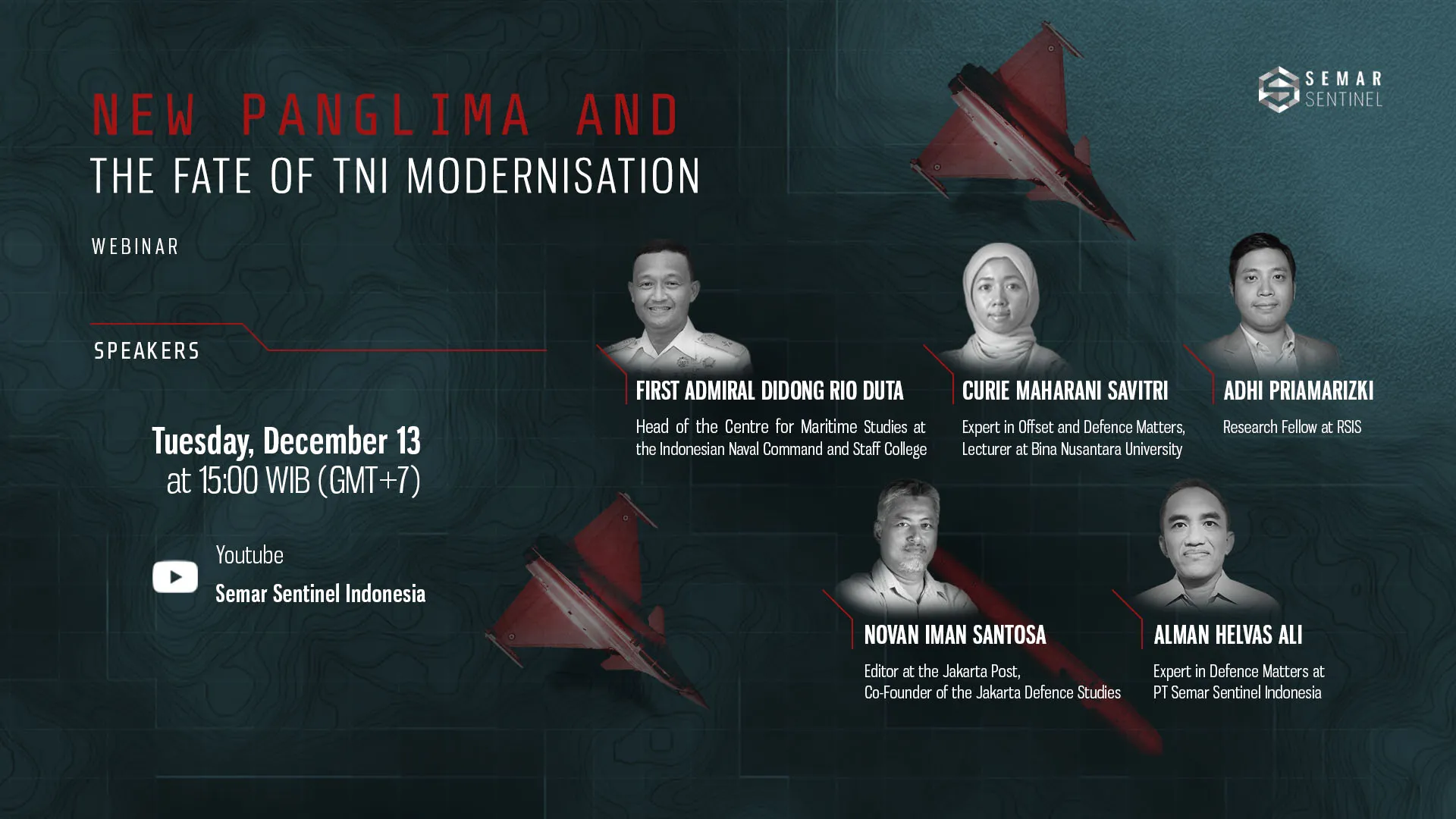
New Panglima and the Fate of TNI Modernisation
Opening Remarks
Anastasia Febiola S

Anastasia Febiola S
New Panglima and the Fate of TNI Modernisation
Summary
Our Research Coordinator & Head of Defence, Anastasia Febiola S., mentioned a number of interesting questions related to the appointment of Admiral Yudo Margono as the next Commander (Panglima) of the Indonesian National Armed Forces (TNI) and its impact on the organisation’s modernisation process.
Speaker
Cmdre. Didong Rio Duta

Cmdre. Didong Rio Duta
New Panglima and the Fate of TNI Modernisation
Summary
In our latest discussion, Cmdre. Didong Rio Duta described the background, experience and leadership style of Admiral Yudo Margono, the navy’s long-term modernisation targets, and the challenges that TNI must face in 2023, especially when it comes to arms modernization and procurement.
Speaker
Adhi Priamarizki

Adhi Priamarizki
New Panglima and the Fate of TNI Modernisation
Summary
In our latest webinar, Adhi Priamarizki mentioned the priorities of the new Panglima and emphasised that he is not the only actor who influence the national defence policy, including in terms of arms modernisation and acquisition. M. Priamarizki also gave several recommendations so that TNI modernisation can be implemented more efficiently considering the existing constraints.
Speaker
Novan Iman Santosa

Novan Iman Santosa
New Panglima and the Fate of TNI Modernisation
Summary
In our latest discussion, Novan Iman Santosa reminded that ideally, the new Panglima would not only be responsible for continuing existing programmes, but also formulating a post-2024 military modernisation roadmap. M. Santosa also mentioned the list of arms procurement contracts that have yet to be executed.
Speaker
Curie Maharani Savitri
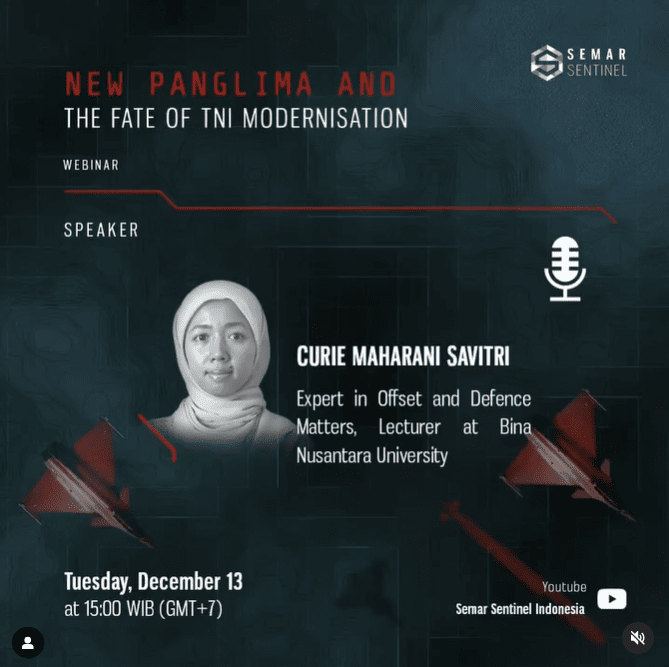
Curie Maharani Savitri
New Panglima and the Fate of TNI Modernisation
Summary
In our latest webinar, Curie Maharani Savitri explained the impact of the latest leadership regeneration within the TNI and how the new Panglima will most likely continue to execute existing programmes due to his limited time in office and budget constraints, among other things. Additionally, Ms. Savitri described how Indonesia could boost its defence diplomacy in 2023.
Speaker
Alman Helvas Ali
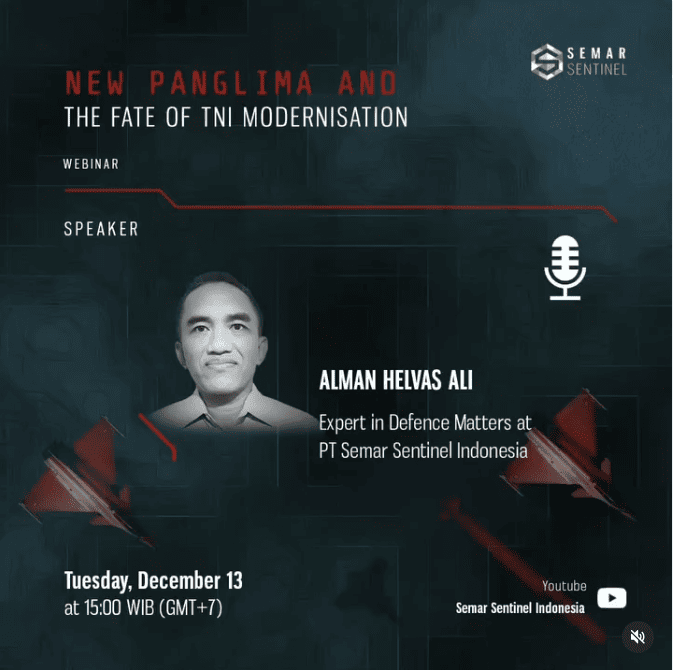
Alman Helvas Ali
New Panglima and the Fate of TNI Modernisation
Summary
In our latest discussion, Alman Helvas Ali underlined the lack of budgetary support to modernise the Indonesian Navy’s (TNI AL) major weapon systems and what are the prospects for Indonesia’s arms procurement in the Fiscal Year 2023.
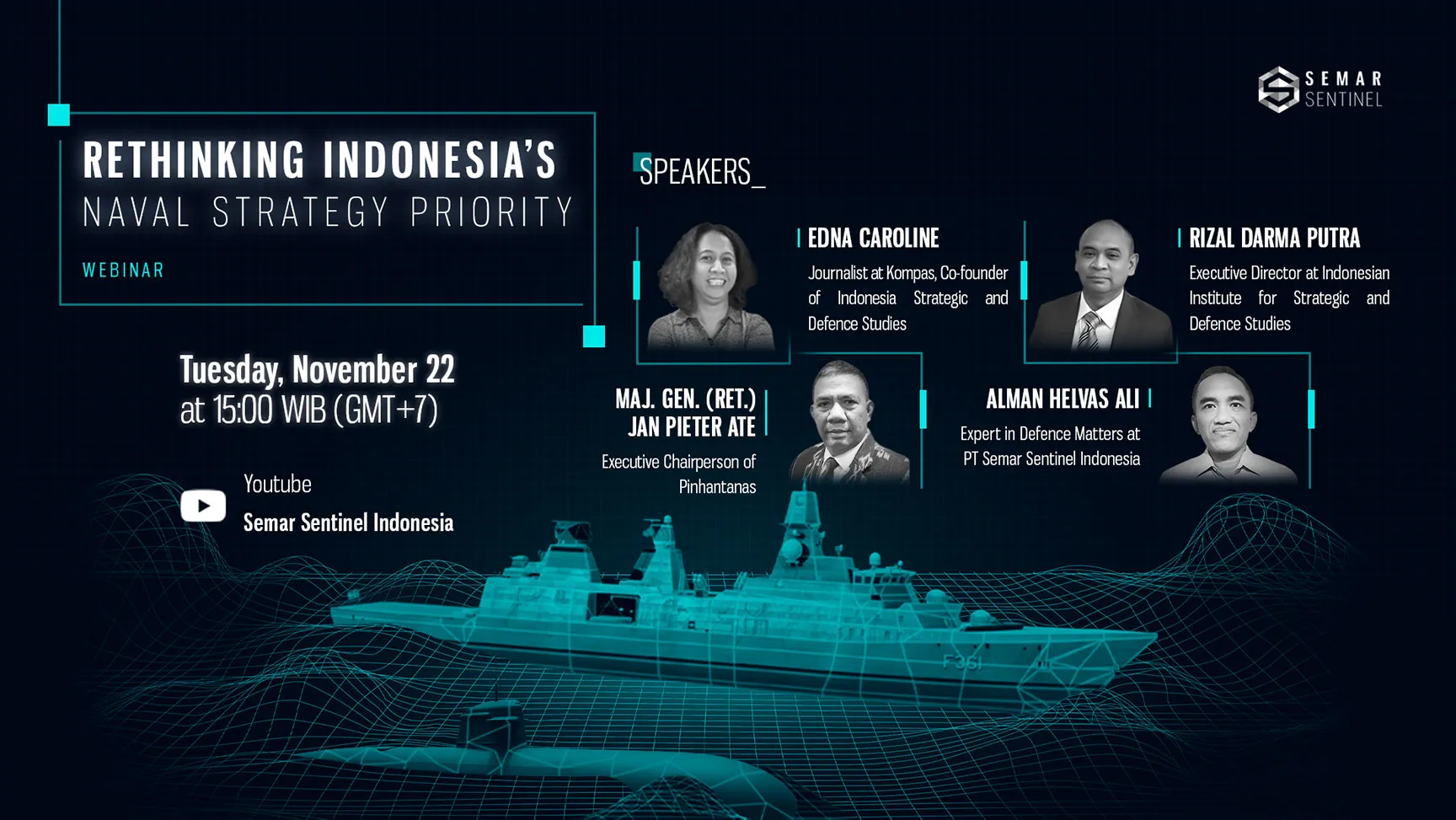
Rethinking Indonesia’s Naval Strategy Priority
Opening Remarks
Anastasia Febiola S

Anastasia Febiola S
Rethinking Indonesia’s Naval Strategy Priority
Summary
Our Research Coordinator & Head of Defence, Anastasia Febiola S, emphasised the importance of the development of domestic defence products to fulfil TNI AL’s operational needs. Furthermore, relevant stakeholders must set a scale of priorities in terms of implementing defence projects to achieve an effective, efficient, and adaptive naval strategy.
Speaker
Maj, Gen. (Ret.) Jan Pieter Ate
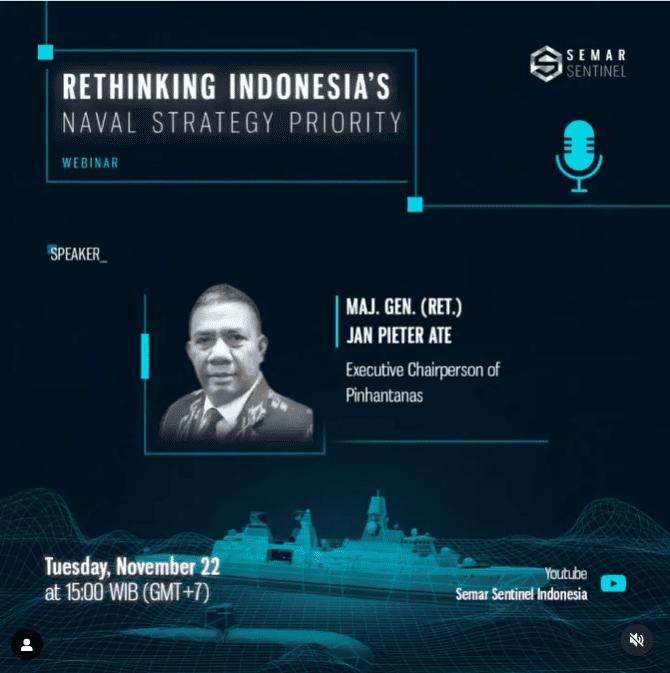
Maj, Gen. (Ret.) Jan Pieter Ate
Rethinking Indonesia’s Naval Strategy Priority
Summary
In our latest webinar, Maj. Gen. (Ret.) Jan Pieter Ate highlighted significant progress of domestic shipyard companies, which have started to expand their military-related capabilities. However, M. Ate mentioned a challenge that TNI AL might encounter, such as limited capacity of shipyard facilities and main naval bases to support TNI AL operations.
Speaker
Rizal Darma Putra
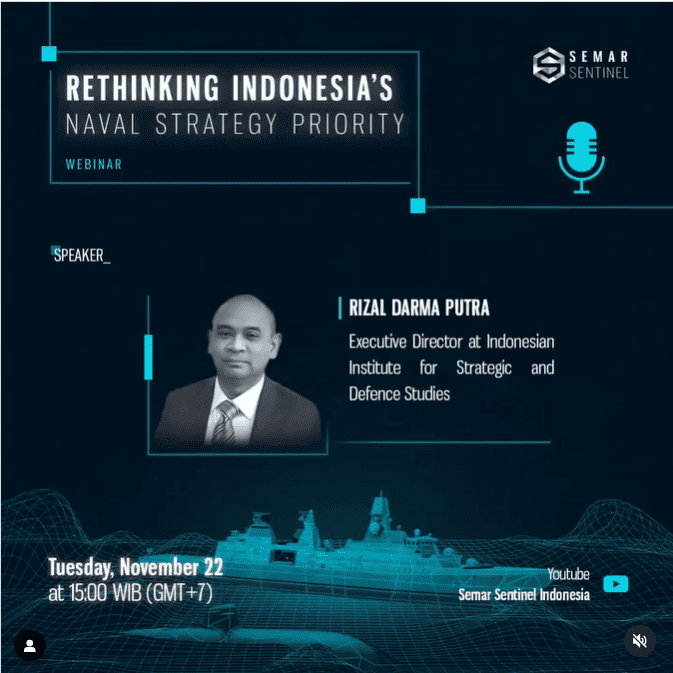
Rizal Darma Putra
Rethinking Indonesia’s Naval Strategy Priority
Summary
In our latest discussion, Rizal Darma Putra highlighted maritime security threats that could possibly disrupt Indonesia’s sovereignty. Furthermore, the current issue of budget constraints might hinder the Indonesian Navy to acquire the integrated weapons systems needed to establish an effective naval strategy. Thus, M. Putra encouraged the Indonesian Navy to prepare mitigation and contingency plans to overcome such challenges.
Speaker
Edna Caroline
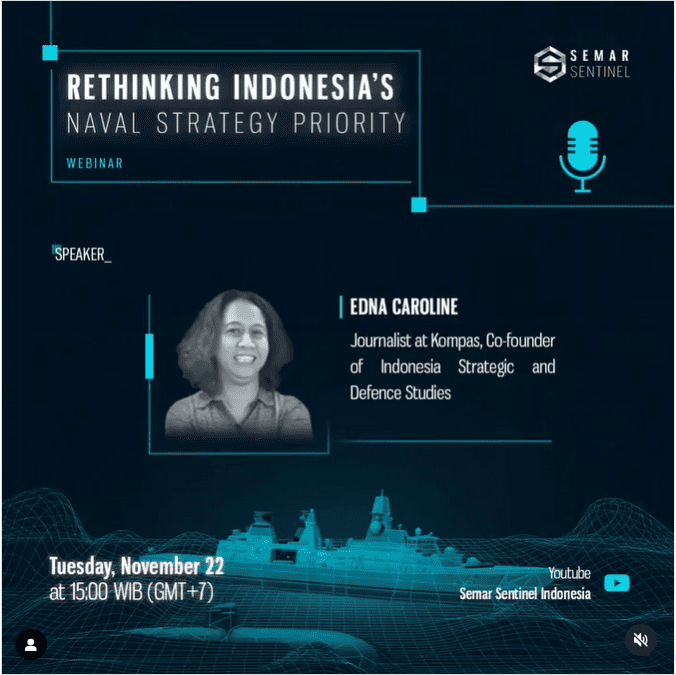
Edna Caroline
Rethinking Indonesia’s Naval Strategy Priority
Summary
In our latest discussion, Edna Caroline emphasised that the current Minimum Essential Force (MEF) target has been reduced due to budget limitations. Thus, Ms. Caroline argued that the Indonesian Navy’s presence and control are lacking due to such a challenge.
Speaker
Alman Helvas Ali
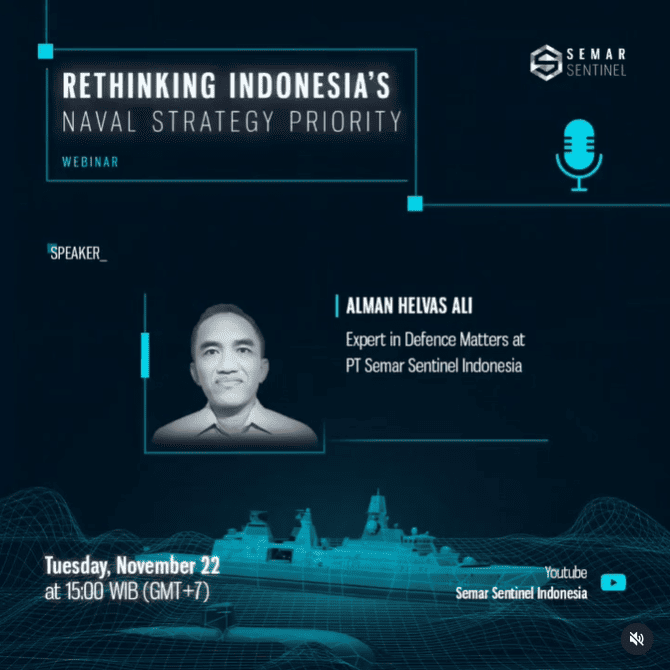
Alman Helvas Ali
Rethinking Indonesia’s Naval Strategy Priority
Summary
In our latest webinar, Alman Helvas Ali discussed the current state of Indonesian naval forces and the challenges they are currently facing. It might be difficult for Indonesia to increase its naval capabilities with the existing fiscal constraints.
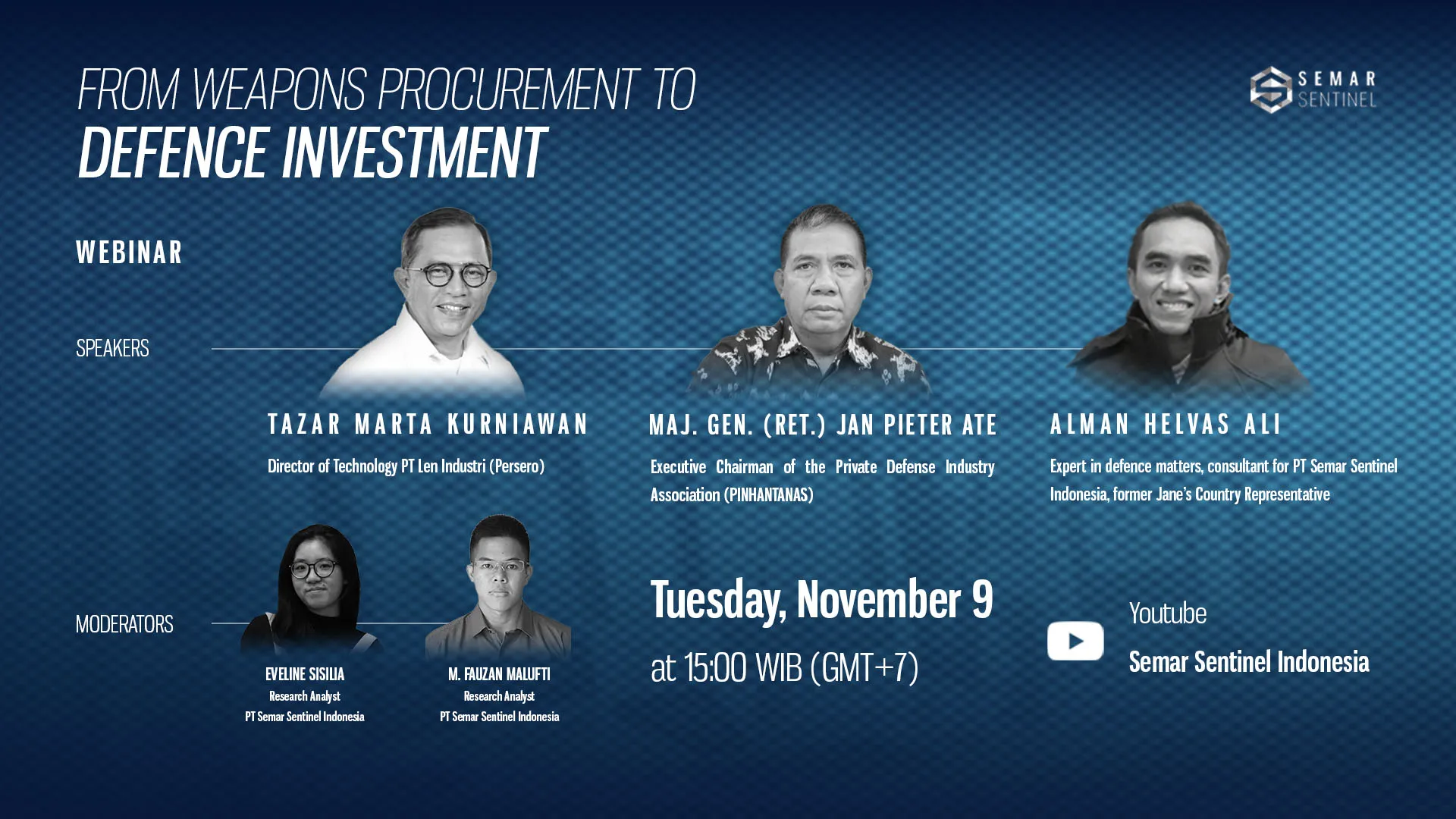
From Weapons Procurement to Defence Investment
Speaker
Alban Sciascia
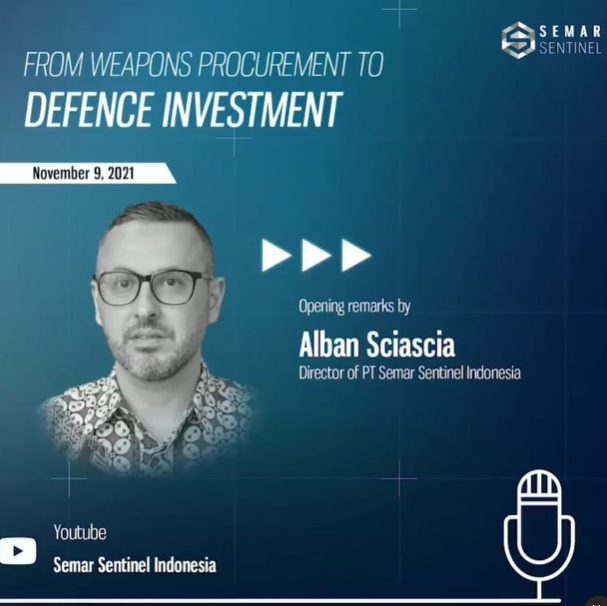
Alban Sciascia
From Weapons Procurement to Defence Investment
Summary
Our Director, Alban Sciascia, explained how defence investment will not only strengthen Indonesia’s defence posture, but also contribute to the country’s post-COVID-19 economic recovery effort by providing jobs for the domestic defence industry through Transfer of Technology (ToT) and offset programs.
Speaker
Maj, Gen. (Ret.) Jan Pieter Ate
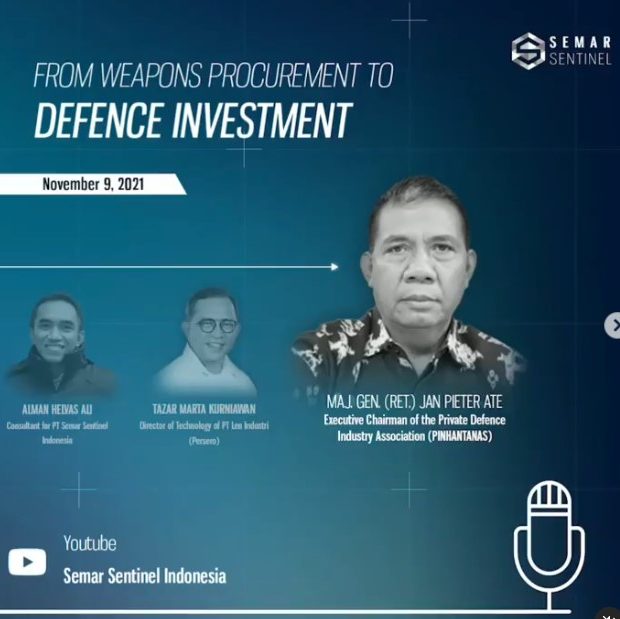
Maj, Gen. (Ret.) Jan Pieter Ate
From Weapons Procurement to Defence Investment
Summary
Maj. Gen. (Ret.) Jan Pieter Ate highlighted that to support defence investment, Indonesia must have a long-term modernisation plan to purchase defence equipment until 2045. In addition, Indonesia must also increase its defence spending to provide more opportunities for the domestic defence industry to receive transfer of technology.
Speaker
Tazar Marta Kurniawan
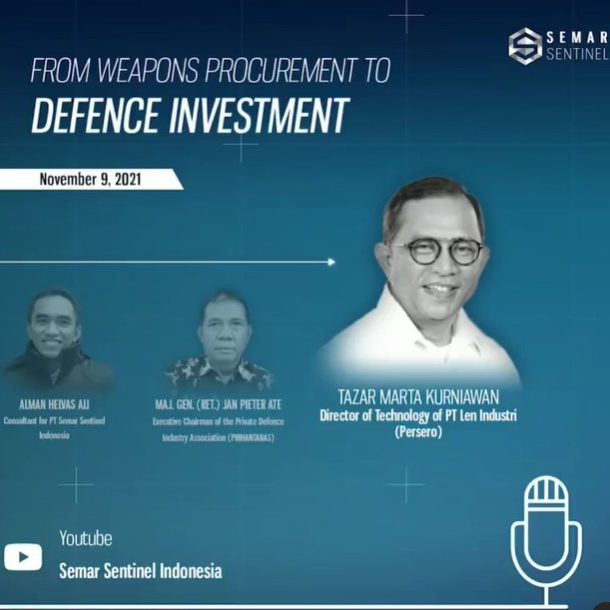
Tazar Marta Kurniawan
From Weapons Procurement to Defence Investment
Summary
In our latest webinar held on November 9, Tazar Marta Kurniawan explained that there is a need for co-production of defence equipment in order to increase local defence companies’ production capabilities and capacities.
Speaker
Alman Helvas Ali
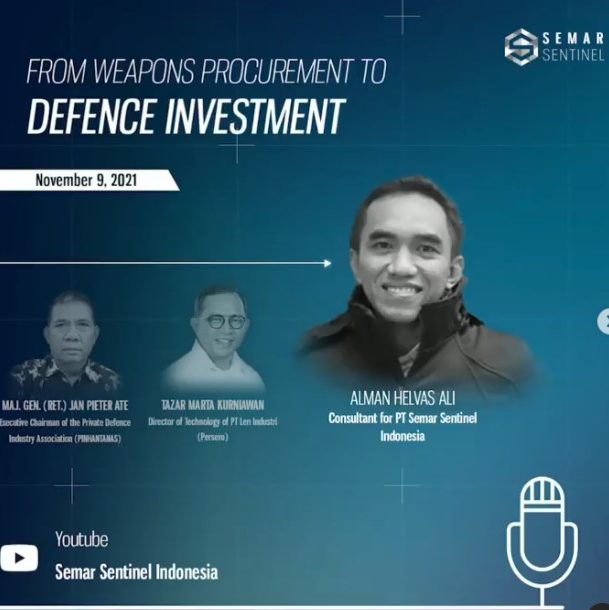
Alman Helvas Ali
From Weapons Procurement to Defence Investment
Summary
Alman Helvas Ali explained that looking at the case of India and Brazil, offsets from weapons procurement could create tens of thousands of jobs in Indonesia and would benefit both domestic state-owned and private defence industry actors. He also emphasised that defence industry actors should keep in mind that they are business entities and should aim for profit to survive.
